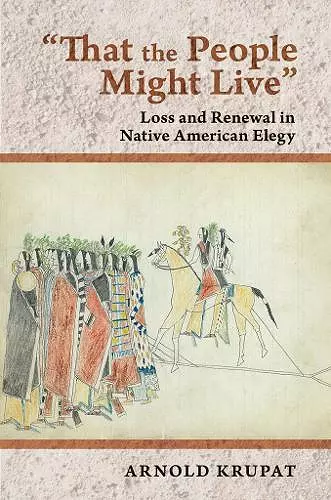"That the People Might Live"
Loss and Renewal in Native American Elegy
Format:Hardback
Publisher:Cornell University Press
Published:15th Nov '12
Currently unavailable, and unfortunately no date known when it will be back

The word "elegy" comes from the Ancient Greek elogos, meaning a mournful poem or song, in particular, a song of grief in response to loss. Because mourning and memorialization are so deeply embedded in the human condition, all human societies have developed means for lamenting the dead, and, in "That the People Might Live," Arnold Krupat surveys the traditions of Native American elegiac expression over several centuries.
Krupat covers a variety of oral performances of loss and renewal, including the Condolence Rites of the Iroquois and the memorial ceremony of the Tlingit people known as koo’eex, examining as well a number of Ghost Dance songs, which have been reinterpreted in culturally specific ways by many different tribal nations. Krupat treats elegiac "farewell" speeches of the eighteenth and nineteenth centuries in considerable detail, and comments on retrospective autobiographies by Black Hawk and Black Elk. Among contemporary Native writers, he looks at elegiac work by Linda Hogan, N. Scott Momaday, Gerald Vizenor, Sherman Alexie, Maurice Kenny, and Ralph Salisbury, among others. Despite differences of language and culture, he finds that death and loss are consistently felt by Native peoples both personally and socially: someone who had contributed to the People’s well-being was now gone. Native American elegiac expression offered mourners consolation so that they might overcome their grief and renew their will to sustain communal life.
"Arnold Krupat is a deeply respected scholar... He has done much to help the world contextualize relationships between Native American literary voices and the American canon... a book that so powerfully details aspects of the Native American response to loss and death. Krupat is strongest when tackling the specifics of intercultural differences." —Joy Porter
* The Journal of American History *Arnold Krupat offers an intensive, detailed, and well-researched literary analysis of Native American elegy from the 16th to the late 20th century.... Krupat's book clarifies the differences between traditional Native American and Euro-American elegiac expression, making it a great addition to the shelves of Native American, western, and borderlands scholars.
-- Scott Comar * Pacific Northwest Quarterly *Assessing the nature of elegy in Native American oral and written expression, Krupat looks at the way such elegiac material develops a sense of healing not through a focus on the loss of an individual but by contributing to a continuance of the community, the people.... This is a careful, revealing, and engaging contribution to the historical examination of oral and written expression of Native American experience.
* Choice *To his credit, and to our good fortune, Krupat opted to resist the temptation to hold that there was no such thing as Native American elegy, and, critically, he opted to recognize crucialdifferences between elegies first spoken and later written by Native Americans and those penned by European and Euro-American writers..Readers in general will recognize that Krupat, a scholar who has devoted his academic life to the study of Native American literatures, has produced a book both careful and caring, a book that will reward thoughtful attention.
-- Chris Lalonde * Great Plains QuarterISBN: 9780801451386
Dimensions: 229mm x 152mm x 25mm
Weight: 907g
256 pages